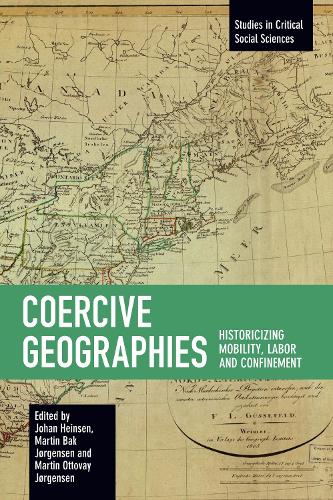
Coercive Geographies: Historicizing Mobility, Labor and Confinement
(Paperback)
Publishing Details
Coercive Geographies: Historicizing Mobility, Labor and Confinement
By (Author) Johan Heinsen
Edited by Martin Bak Jrgensen
Edited by Martin Ottovay Jrgensen
Haymarket Books
Haymarket Books
25th March 2022
United States
Classifications
General
Non Fiction
Social and cultural history
Migration, immigration and emigration
325.1
Physical Properties
Paperback
230
Width 152mm, Height 228mm
Description
Responding to the deteriorating situation of migrants today and the complex geographies they navigate, Coercive Geographies examines historical and contemporary forms of coercion and constraint exercised by a wide range of actors in diverse settings. It links the question of spatial confines to that of labor. Coercive Geographies represents an important attempt to bring together space, precarity, labor coercion and mobility in an analytical lens. Precarity emerges in particular geographical and historical contexts, which are decisive for how it is shaped. This volume analyzes coercive geographies as localized and spatialized intersections between labor regulations and migration policies, which become detrimental to existing mobility frameworks.
Contributors include: Irina Aguiari, Abdulkadir Osman Farah, Leandros Fischer, Konstantinos Floros, Johan Heinsen, Martin Bak Jrgensen, Martin Ottovay Jrgensen, Apostolos Kapsalis, Karin Krifors, Sven Van Melkebeke, Susi Meret, and Vasileios Spyridon Vlassis.
Author Bio
Johan Heinsen is Associate Professor at the research group Conflict, Coercion and Authority in History (CCA) at the Department of Politics and Society, Aalborg University. He works on labor coercion and punishment across the early modern world. He is vice-chair of the COST-action Worlds of Related Coercions in Work. Martin Bak Jrgensen is Associate Professor at the Department for Culture and Learning, Aalborg University, Denmark. He works within sociology and political geography. He has published Solidarity and the Refugee Crisis in Europe (Palgrave, 2019) with scar Garca Agustn. Martin Ottovay Jrgensen holds a Ph.D. in International History. His research explores how international peacekeeping within the context of an international system significantly influenced by multiple imperial regimes is linked to inequality and insecurity.
